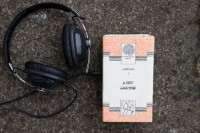
Find yourself a muse (preferably nude but clothed will do) – and 9 more writing tips
irishtimes.com – Monday July 2, 2018

1. If your writing’s not flowing, rip it up. For me, the most successful pieces are always the most free-flowing. If it’s a struggle, be aware that a reader will intuit that too, so pull the plug. After all, Robert Louis Stevenson started 393 works only to finish 27 of them. I honestly can’t think of any job other than writing that involves as much waste – it’s worse than working in an effluent plant!
2. Keep fuelling your brain as you write. As I write this, I’m eating Baked Beetroot & Golden Linseed Tortillas which masquerade as healthy, a bit like myself, but are probably as bad as Monster Munch. While my right hand clicks on the mouse, my left dips more industriously into the tortillas. Testifying to the fact that I’ve just given birth to a new play, I need to lose a few pounds which leads seamlessly into…
Don’t dip your pen in someone else’s blood: writers and ‘the other’
irishtimes.com – Sunday July 1, 2018
Was there ever any worse advice than write what you know? Who of the greats ever wrote what they knew? Did Charlotte Bronte live in a grand country house with a man called Edward Rochester who tried to commit bigamy with her before she wrote Jane Eyre? Was Gustave Flaubert a woman who committed adultery before he wrote Madame Bovary? And how many of us could write a good book if we only wrote what we know? I would have to write about a middle-aged woman who lives in a midlands town, visits Tesco and tends her garden. No story there. No bestseller. Because it’s not interesting. As writers we have to make things up if we want to spin a good yarn. We have to have a murder or two, a broken heart, a bank robbery, a ride in a spaceship.

How To Write A Novel: Tips From Across The Literary Sphere
elle.com – Friday June 15, 2018

Who hasn't wistfully stared out of a train window, engrossed in a deep, perfectly soundtracked moment, and thought to themselves, "I think I've got a book in me"?
The trouble is, putting pen to paper is notoriously much harder than simply revelling in a cinematic moment during your daily commute.
Whether it's writer's block, a serious problem with procrastination, or not knowing what to do with your finished manuscript, ELLE invited some of publishing's most exciting names to discuss how to write the book in you, and then get it published.

Always Do a Test Run of That Fancy New Writing App
lifehacker.com – Saturday June 9, 2018

So you have a new writing app you’re dying to try, eh? Well, before you sit down to take on that big writing project, consider giving that app a solid test run so you can learn all the ins and outs first.
There’s this feeling that comes with a fancy new piece of writing software, or productivity software in general. It’s a feeling of potential, of power, like you’ve suddenly found the secret that’s going to help you to finish your novel, your screenplay, or that school paper that decides whether you pass or fail. Unfortunately, that feeling quickly fades when you realize you have no idea how to use it. If there’s one thing that will freeze your flow into self-manifested writer’s block, it’s an app’s learning curve.

Here's What It's Actually Like to Write Romance Novels for a Living
cosmopolitan.com – Tuesday June 5, 2018

Lauren Blakely knows romance. In 2018 alone — which, reminder, is not even half over yet — she's released five books and has at least five more coming. Here, she shares her tips for aspiring writers, romance or otherwise, and explains how a good sex scene makes a reader sweat.

Murder mystery author Jane Harper has six tips for writing a bestselling novel
abc.net.au – Sunday June 3, 2018

In 2014, Jane Harper decided she was finally going to do it — she was going to write a book.
She enrolled in an online writing course, and in just twelve weeks had completed her first draft of The Dry.
The fast paced, hard-edged crime novel was the kind novel Harper had always wanted to write.
"I like books with a bit of mystery and suspense," the former journalist says.
It was an instant hit. Critics loved The Dry for its elegant structure, Australian voice, and Harper's ability to vividly paint a landscape in the grip of drought.
Readers loved it for its tight pace, its awkward, lovable hero and its satisfying "whodunnit" reveal.
The book raced on to bestseller lists around the world, won multiple awards, and was sold in to more than 20 foreign language territories.
Today, Harper is still riding high on the success of The Dry.
The movie rights have been sold to Reece Witherspoon's production company, and the script is complete. Harper's second book, Force of Nature, has been another bestseller, and she has another on its way.
So, how does she do it?
While at the Sydney Writers' Festival, Harper revealed the secrets to writing a bestselling novel. Writers, grab your pencils...

Ireland's thriving literary magazine scene: space for tradition and experimentation
irishtimes.com – Saturday May 19, 2018

Reading the mission statements of Irish literary journals, a common theme emerges: the desire to offer writers the space to develop ideas that may not otherwise find a platform. From the more established titles such as Dublin Review, Crannóg and The Stinging Fly, which published its first issue 20 years ago this month, to more recent outlets like The Bohemyth, Banshee and gorse, fostering talent new and old is the backbone of “the little magazine”.
A vibrant journal scene with a roots-up feel to it has developed in Ireland in the past decade. There are currently in the region of 30 publications across print and online media seeking submissions multiple times a year. This has coincided with a growing enthusiasm for creative writing in general, with all of the major colleges in Ireland and many other cultural organisations offering programmes ranging from evening courses for beginners to two-year MFAs (Master of Fine Arts).

It Used To Be Perilous To Write Fanfiction
kotaku.com – Thursday May 17, 2018

Fanfiction is hardly a new phenomenon, but that doesn’t always mean it was safe to write. For a time, in certain fandoms, writing fanfiction could get you a letter from a lawyer. Now, however, the internet has given fandom enough leverage to allow the dubiously legal practice of writing about other people’s characters continues to flourish.
Fanfiction, the act of writing original stories based on someone else’s creative work, exists in a sketchy legal space. While derivative and transformative works are technically protected under fair use, many authors do not believe fanfiction falls in that category. Authors that still dislike or disallow fanfiction cite an experience that author Marion Zimmer Bradley had in 1992. Bradley not only liked but encouraged fanfiction in the initial stages of her fandom, but as the story goes, she realized that an upcoming novel of hers would touch on themes that were in a fanfiction she had read, and she reached out to the author to attempt to negotiate a deal so as to avoid a lawsuit. Although not all parties can agree on how much of Bradley’s novel had been written or exactly what the terms of the agreement were with this fanfic author, Bradley said that she decided to scrap the novel rather than risk a lawsuit. This story loomed large in the memories of authors like Anne McCaffrey and George R. R. Martin, who cited it as an example of what can happen if you don’t protect your copyright. While Martin allows fanfiction as long as you don’t send it to him, McCaffrey banned all fanfiction for her series Dragonriders of Pern from 1992 until 2004.

Writing for the improbable bookshelf
thebookseller.com – Monday May 14, 2018

I make stories for improbable bookshelves. I once came across this term in an Italo Calvino essay and I’ve held on to it ever since, as it so closely describes the way I work.
I recently wrote a new version of the Persephone myth, but it can’t be found in a bookshop or online. Persephone’s Footsteps is an altitude-responsive story and map that has to be carried on a journey through a city. As Persephone climbs higher – first to escape the Underworld and then to escape the polluted city streets – the listener must climb higher to reveal more of her story. At the moment, there is only one version of this work in existence. Is it scalable? Perhaps, but my real hope is that it’s my approach to writing that’s scalable – that writers might be inspired to explore new ways of writing, bringing enlivened approaches to literary forms.

How to write a book: 11 tips on creating a bestseller from published authors
cosmopolitan.com – Monday May 14, 2018

While it's easy to romanticise writing a novel on the side, knowing how to actually write a book and where the F to start can be a little daunting. Here, 11 published authors, who will be at Hay Festival between 24 May - 3 June, share their tips and tricks for starting your next masterpiece. And who knows? It might end up being a bestseller.
Get the free newsletter | Submit a news item or article | Get Writers' News for your website





